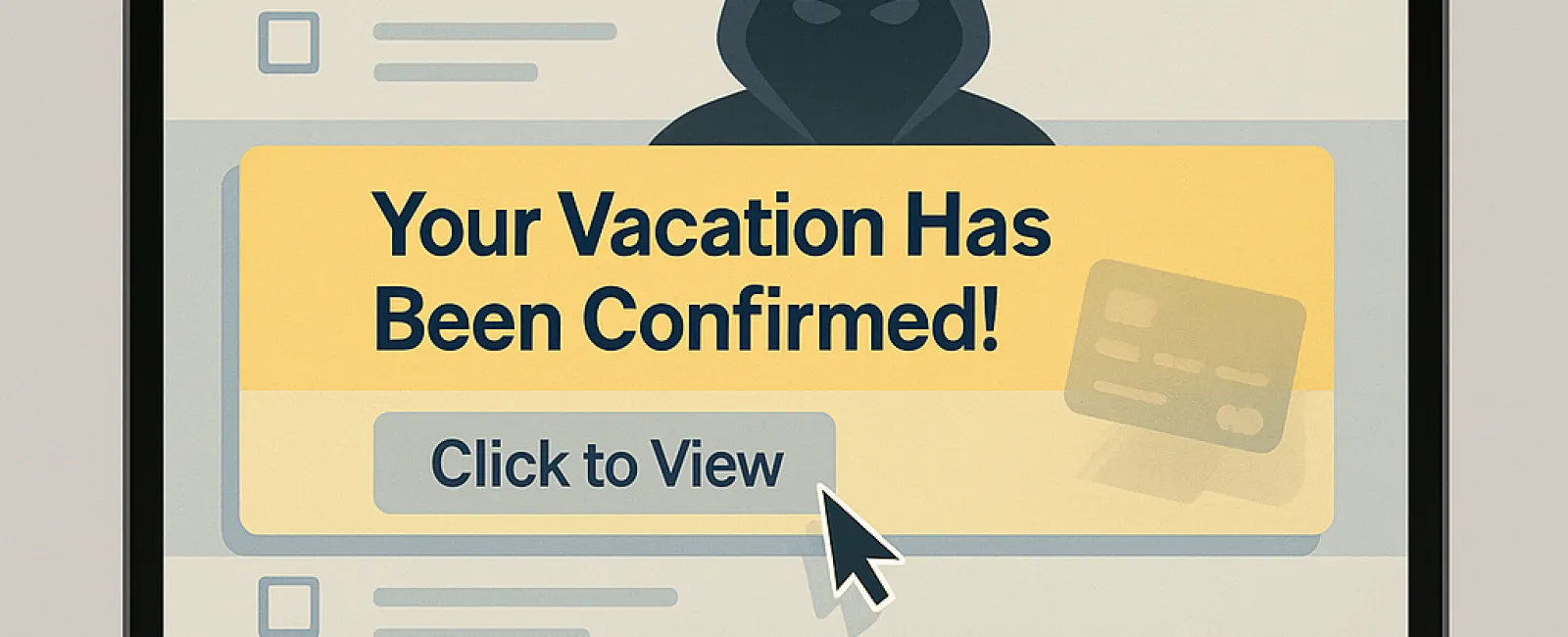May 12, 2025
Taking a Trip This Year? Watch Out for Fake Travel Confirmation Emails
Summer travel season is heating up, and so are cyber scams.
Cybercriminals are banking on your vacation plans by sending convincing fake booking confirmation emails that look nearly identical to messages from legitimate airlines, hotels, and travel agencies.
Even seasoned travelers and tech-savvy employees have been fooled.
These phishing emails are designed to:
-
Steal your personal and financial data
-
Compromise your login credentials
-
Install malware on your device
How the Travel Scam Works
Step 1: A Fake Booking Lands in Your Inbox
It looks legitimate. The email might appear to be from:
-
Expedia
-
Delta Airlines
-
Marriott
-
Airbnb
Hackers replicate branding and formatting perfectly, complete with logos and even fake customer service numbers.
You might see subject lines like:
-
"Your Flight to New York Has Been Confirmed - View Itinerary"
-
"Important Update: Change to Your Hotel Booking"
-
"Action Required: Confirm Your Travel Plans"
-
"Your Car Rental Is Waiting - Final Step to Complete Reservation"
Step 2: You Click, and It Takes You to a Fake Site
The email prompts you to "log in" to update payment details, review your itinerary, or confirm booking info.
But the link directs you to a phony website that mimics the real one. Enter your credentials or payment details, and they're instantly harvested by the attacker.
Step 3: The Damage Begins
Once you've handed over your information:
-
Hackers can access travel or bank accounts
-
Fraudulent charges may hit your credit card
-
Malware can be downloaded onto your device, potentially spreading across your network
Why This Scam Works So Well
-
They Look Real - These emails closely imitate official correspondence
-
They Create Panic - Urgent language causes people to react quickly
-
People Are Distracted - When you're busy or excited about a trip, you're less cautious
This Isn't Just a Personal Threat, It's a Business Risk
If your company has staff who travel, especially if one person manages bookings, the stakes are even higher.
Think about:
-
Executive assistants or office managers handling multiple reservations
-
Corporate travel accounts with saved payment info
-
Shared credit cards used for flights, hotels, and events
A single phishing email can lead to:
-
Credit card fraud
-
Compromised business accounts
-
Malware infecting your internal systems
How to Protect Yourself and Your Organization
✅ Don't click email links — Always go directly to the travel provider's website to log in or check reservations.
✅ Inspect the sender's address — A scam might come from "@deltacom.com" instead of the legitimate "@delta.com."
✅ Train your team — Educate staff, especially those who manage travel, on what these scams look like.
✅ Enable MFA — Multifactor authentication protects your accounts even if your credentials are stolen.
✅ Secure your email system — Use email protection tools to block malicious attachments and suspicious URLs.
Don't Let Fake Travel Emails Ruin Your Summer or Your Business
Cybercriminals are targeting travelers and businesses right now. Don't wait until someone clicks the wrong link.
Start with a FREE Cybersecurity Assessment from Dragonfly MSP.
We'll assess your current defenses, spot weak points, and help you prevent phishing attacks like these.

